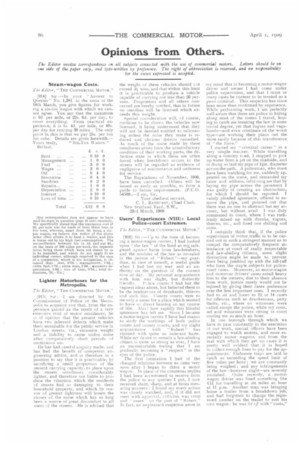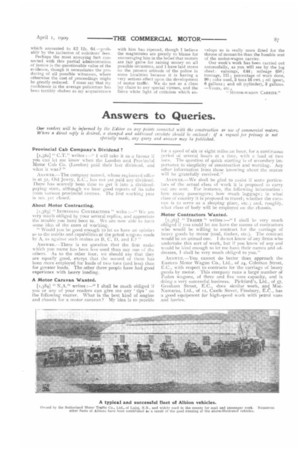Opinions from Others.
Page 18

Page 19

If you've noticed an error in this article please click here to report it so we can fix it.
The Editor invites correspondence on all subiects connected with the use of commercial motors. Letters should be on use side of the paper only, and tyPe-written by preference. The right of abbreviation is reserved, and no responsibility for the views expressed is accepted.
Steam-wagon Costs.
The Editor," THE COMMERCIAL MOTOR."
[914] Sir your Answer to Queries" No. 1,381: in the issue of the 18th March, you give figures for working a six-ton wagon with which we cannot agree. You say that the maximum is 9d. per mile, or 22s. 6d. per day, to cover everything. From practical experience, it is is. 4d. per mile, or 40s, per day for running 30 miles. The only point in this is that we pay 25s. per ton for coke. Details are given herewith.— Yours truly, "Six-TON WAGON." Belfast.
Our correspondent does not appear to have read the reply in question (page 41 ante) carefully. We specifically stated that the maximum cost of 95. per mile was for loads of from three tons to five tons, whereas, apart from its being a sixton wagon, we believe the writer of the above letter often allows it to haul a trailer, and this is borne out by his high fuel consumption, The reconciliation brtween his is. 45, and our 95., on the basis of 180 miles per week, the separate inns being those which were not stated by us to be included, and which do not apply to an individual owner, although required in the case of a contractor, which is his occupation, is obtained thus rent, 0.7d. ; management, 11d.; extra fuel, 11d.; extra man, 1.6d.; excessive depreciation, 1.0d.; loss of time, 0.7d.; total deductions, 7d.—En.]
Lighter Motorbuses for the Metropolis.
The Editor, "THE COMMERCIAL MOTOR."
[915] Sir :--1 am directed by the Commissioner of Police of the Metropolis to acquaint you that, from the experience gained as the result of a very extensive trial of motor omnibuses, he is of opinion that the present vehicles have two inherent defects which make them unsuitable for the public service in London streets, viz., excessive weight and a liability to cause undue noise after comparatively short periods of continuous use.
11e has had careful enquiry made, and has had the benefit of competent engineering advice, and is therefore in a position to say that it is practicable, by sacrificing a small proportion of the present carrying capacity, to place upon the streets omnibuses considerably lighter, and therefore not liable to produce the vibration which the residents of streets find so damaging to their household property, and which by reason of greater lightness will lessen the causes of the noise which has so long been a source of great discomfort to all users of the streets. He is advised that
the weight of these vehicles should net exceed 31 tons, and that Within this limit it is practicable to produce a vehicle capable of carrying not less than 26 persons. Proprietors and all others concerned are hereby notified, that in future no omnibus will be licensed which exceeds this weight.
Special consideration will, of course, continue to be shown the vehicles now licensed, it being understood that they will not be deemed entitled to relicensing unless the noise they make is reduced and obvious defects remedied. As much of the noise made by these omnibuses arises from the unsatisfactory condition of their working parts, the defective state in which these are often found when breakdown occurs in the streets will be regarded as evidence of negligence of maintenance and unfitness for service.
The Regulations of November, 1906, have been cancelled. Others will be issued as early as possible, to form a guide to future requirements. (P.C.O. 54589l.—I am, Sir,
Your obedient servant,
C. L. Ba-rHtnisT, Chief Clerk, New Scotland Yard, S.W., 23rd March, 1909.
Users' Experiences (VIII) : Local Police-court Extremes.
The Editor," THE COMMERCIAL MOTOR."
[916] Sir to the time of becoming a motor-wagon carrier, I had looked upon 'the law " of the land as my. safeguard against harm front law-breakers, and the minister of the law as revealed in the person of "Robert "—my guardian, in case of assault, a useful guide when I had lost my way. and an authority on the question of the correct time of day. My personal acquaintance with him was slight, but distinctly
friendly. Felice courts I had but the vaguest ideas about, but believed them to be the rendezvous of drunkards, thieves and such like. County courts were to me only a name for a place which seemed to have on direct bearing me my course of life. Alas how rapidly this blissful ignorance has left me. Since I became a motor-wagon carrier I have had reason to study the workings of both police courts and county courts, and my slight
acquaintance with " Robert'' has ripened with quite an indecent haste. While my desire to remain a law-abiding citizen is quite as strong as ever, 1 have an uncomfortable feeling that I am gradually becoming a "suspect" in the eyes of the police.
The first intimation I had of the changed relations between us came very soon after I began to drive a motor wagon. In place of the courteous replies
I had been accustomed to receive from the police to ally queries I put, I now received short, sharp, and at times menacing answers ; I found my every action was closely watched, and, if it did not meet with approval, criticism was crisp and " sweet" on the part of " Robert." To fact, ail urVeasant suspicion arose in my mind that in becoming a motor-wagon driver and owner I had come under police supervision, and that I must in many cases be content to be treated as a quasi criminal. This suspicion has since been more than confirmed by experience. While performing work, 1 am perfectly well aware that there are police in hiding along most of the routes I travel, hoping to catch me breaking the law in some trivial degree, yet that rogues and vagabonds--and even criminals of the worst type—are working their plans out the more easily because of this transference of "the force."
I started my "criminal career" in a very simple manner. While travelling along a country rued, I stopped to pick up water from a pit on the roadside, and in doing so laid my pipe of liin, diameter across the path.. A policeman, who must have been watching for me, suddenly appeared on the scene, and demanded my name and address, informing me that by laying my pipe across the pavement I was guilty of creating art obstruction, for which I should be reported. vainly pleaded ignorance, offered to remove the pipe, and pointed out that there was no one to obstruct but my accuser, but without avail I was duly summoned to court, where I was ruthlessly mixed. up with drunks, rogues, thieves, etc., and fined one shilling and costs.
certainly think that, if the police supervision of motor traffic is to be carried out ie such a stringent manner as to compel the comparatively frequent attendance at court of really respectable and law-abiding citizens, some slight distinction might be made to prevent their being jumbled up with the riff-raff who form the staple subjects for policecourt cases. Moreover, as motor-wagon and motorcar drivers' cases entail heavy loss to the owners, due to their absence from work, justice surely would not be injured by giving their cases preference over the less important ones. I recently had to sit and listen to 12 or 14 cases for offences such as drunkenness, petty thefts, etc., where no witnesses were called except the police, while my come. sel and witnesses were sitting in court costing me so much an hour.
In one borough through which we have to pass constantly in the execution of our work, special officers have been engaged to watch motors, and more especially motor wagons, and from the zeal with which they get up cases it is pretty well evident that it is hoped to collect enough fines to pay for the appointments. Elaborate traps are laid to catch us exceeding the speed lindt of five miles per hour ; we are constantly being weighed ; and any infringements of the law—however slight—are severely punished. Quite recently, a motor. wagon driver was fined something like for travelling at six miles an hour at 11 p.m. Another man was bringing home a trailer from a breakdown job, and had forgotten to change the registered number on the trailer to suit his own wagon : he was let of with "costs," which amounted to £2 12s. 6d.—probably by the inclusion of solicitors fees.
Perhaps the most annoying fact connected with this partial administration of justice is the questionable value of the evidence, though it necessitates the producing of all possible witnesses, where otherwise the cost of proceedings might be greatly reduced. I must say that my coafidence in the average policeman has been terribly shaken as my acquaintance with him has ripened, though I believe the magistrates are greatly to blame for encouraging him in the belief that motors are fair game for raising money on all possible occasions, and I have laid stress on the present attitude of the police ia some localities because it is having a very serious effect upon the development of motor traffic. We do not as a class lay claim to any special virtues, and the fierce white light of criticism which ea Nelops us is really more fitted for the throne of monarchs than the humble seat of the motor-wagon carrier.
Our week's work has been carried out successfully, as you will see by the log sheet : earnings, £44; mileage 658; tonnage, 111; percentage of work done, 90; coke used, 5 tons 16 cwt. ; oil (gear), 6 gallons ; and oil (cylinder), 3 gallons. —Yours, etc., " MOTOR-WAGON CARRIER."






















